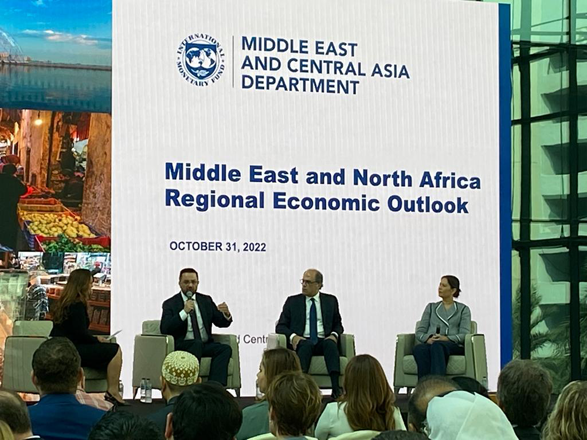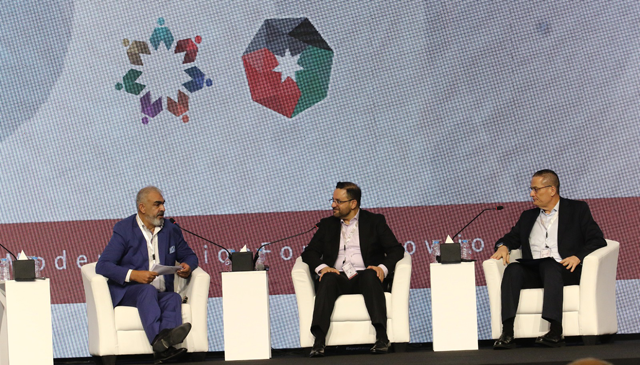You are here
Al-Ississ voices emerging market’s perspective at IMF economic outlook launch
By JT - Oct 31,2022 - Last updated at Oct 31,2022

Minister of Finance Mohamad Al-Ississ speaking at the launch of the International Monetary Fund’s Middle East and Central Asia Regional Economic Outlook in Dubai on Monday (Photo courtesy of Finance Ministry)
AMMAN — As the US and Europe are hitting on inflation, each hit has spillover effects on the Arab region, said Jordan Minister of Finance Mohamad Al-Ississ at the launch of the International Monetary Fund’s (IMF) Middle East and Central Asia Regional Economic Outlook (REO) in Dubai on Monday.
Al-Ississ was invited to speak at the international forum on a panel of media outlets and economists.
The IMF REO warns of the global economic risks stemming from supply shocks, the ongoing war in Ukraine, and inflation. Uncertainty will worsen over the next year, as economic growth is threatened globally in a manner that will impact the region, in particular oil-importing countries.
Food security in particular is anticipated to be a rising concern given shortages in supply of wheat, and oil prices are also expected to rise, adding pressures for oil-importing countries.
Al-Ississ argued that global slowdowns are anticipated to translate into twin deficits in balance of payments and fiscal, as governments step in to help the most vulnerable in their population.
The minister’s assessment of impact of these crises on the region is that countries like Jordan have done the reform work required, but are facing another cycle of the treadmill becoming even faster.
On a country-level, high commodity prices are expected to impact balance of payments and deficits. But more importantly, it will limit the ability of individual households to address their needs and balance long-term investments with immediate needs.
The minister also called attention to issues that are often away from the headlines, such as the ongoing refugee crisis and the vulnerable groups, many of which are reeling from crises of their own.
Al-Ississ called on the Fund and global community to keep in mind when designing policies, the eventualities of the past, crises do not recognise borders when the domino tumbles.
Global solutions must be provided for states who are made vulnerable by global crises, Al-Ississ argued, with solutions including concessional financing given the high interest rate environment.
For his part, Director of the Middle East and Central Asia Department at the IMF Jihad noted that Jordan is doing policy differently, and has been able to preserve its key economic fundamentals by key reforms.
Related Articles
AMMAN — Speaker of the Lower House Ahmad Safadi on Sunday, chaired the Parliamentary Financial Committee session to discuss the budget of th
AMMAN — Despite the global economic crisis, the Jordanian economy has managed to overcome it, showcasing its resilience and strength, and th
AMMAN — The Finance Minister Mohamad Al-Ississ, said that the new established programme with the International Monetary Fund (IMF) is an “in












